Opinion

If it needs doing, will it
if it needs dying, kill it
Don’t spend more time disclaiming than proclaiming
Do the work and let the work speak for itself.
If you can, say yes. If you can’t, say no, and make sure your WHY can stand before God

As technology continues to evolve, it is rapidly outpacing the standard ethical frameworks by which we normally approach new developments. The nucleus of technology and sexuality, which was situated around questions of porn, has been forced to answer new questions, grappling not only with what is right and wrong, but why. With the rise of new, impending sexual technology, the church must learn how to speak into this realm.
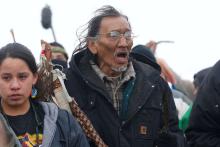
The focus of the confrontation between Phillips and Nick Sandmann remained caught in the news, and people immediately raced the well-worn paths to their ideological camps. But missing from the narrative — and certainly from the new counter-narrative — are the Indigenous voices that have been silenced or villainized by the rise and power of white supremacy in America.

God's justice is divine, meant to benefit everyone created in God's divine image. It’s not dictated by man-made laws, branches of government, political parties, lobbyists, or authoritarian officials. It's not biased towards the wealthy or powerful, and cannot be bought by high-priced lawyers. It's not fueled by populist opinions or partisan rage, and isn’t facilitated through broken systems and institutions. Instead, God’s justice is holy and unblemished, eternally seeking to free the enslaved, empower the downtrodden, and bring judgement upon the oppressors.
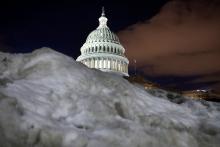
The longest government shutdown in U.S. history reveals the brokenness of our systems, the danger of a strong man exploiting that brokenness instead of trying to fix it, and the suffering of countless people, always beginning with the most vulnerable. It also painfully shows Washington’s current habit of blaming instead of solving problems, which has left our politics both polarized and paralyzed.
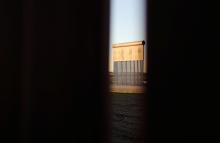
Leaders want to spend billions, not to help people living in desperation, but on the wall. We must ask ourselves, and our elected leaders, what are the true costs when we allow ourselves to be consumed by fear? Are we willing to put the wall ahead of the God of mercy who came to us as a child fleeing violence? Thousands of God’s children remain in the squalor of tent cities in Tijuana and detention centers, unwelcome in Mexico and the United States. Some are returning to violence at home having lost any hope for asylum they are legally entitled to request.

In Redeeming Capitalism, Kenneth J. Barnes argues that the moral failures of our economy are evidence of moral decay in our social institutions. The greed and excess of Wall Street and the vast income inequality between the very wealthy and everyone else demonstrate that the moral fabric of our society is in tatters. What we need, Barnes believes, is a lesson in virtue. Barnes, I think, would like to replace Falwell Jr.’s ethic with a truly Christian one. If we want a virtuous capitalism, he argues, we need virtuous people.
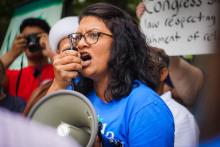
Today, civility policing is just one more layer of rhetorical fog which obscures the truth of our political reality ─ how poverty and cruelty are manufactured and sustained by the policy regime of America’s ruling class. In reality, the Trump tax cut is uncivil, the American support of Saudi Arabia’s war in Yemen is uncivil, the prison-industrial complex is uncivil, ripping families apart at the border is uncivil.

In an effort to help our family grieve the loss of our beloved Vickie Lee Jones, a preacher told us that it was God’s will that a white man named Gregory Alan Bush shot her to death in the parking lot of a Kroger grocery store outside of Louisville, Ky. because, as a witnesses implied, she was black.
It was not.

One reason the Enneagram works well within the capitalist system of work is its intense focus on individuals. The Enneagram reduces arguments of substance to those of procedure, but not typical formal procedure like raising a motion in a meeting according to Robert’s Rules of Order, but emotional procedure based on how each person involved in the argument feels, hears, and understands the substance of what’s being discussed.

But it is not only the horrors that are drawn in vivid detail in the bible; it is also the grace. The New Testament is big on grace — unmerited favor, the idea that everyone is deserving of love regardless of their status and even their actions. It’s utterly illogical, and one of the things I love specifically about Christianity. Grace cannot be taught because it defies explanation; it can only be shown. When Peter calls us to “use whatever gift you have received to serve others, as faithful stewards of God's grace,” he’s making the radical plea to willingly suffer for the benefit of others. There is no place for this logic in our modern lives and yet the bible dares us to disagree; over and over we learn the power of grace through the artistry of the stories.
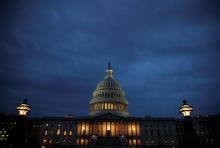
In Donald Trump’s address to the nation last night, meant to emphasize his desire for a physical barrier to close off the southern border, he stated, “Women and children are the biggest victims, by far, of our broken system.” He referenced high rates of sexual assault on the journeys up the southern border and the brutal rape and murder of a California resident by an undocumented immigrant and a U.S. citizen (though he failed to highlight the ladder assailant). I agree with Trump that women and children are the biggest victims of the broken system, though not in all the ways that he had in mind.
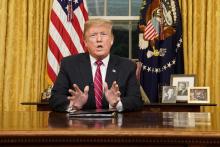
First, racism is always based on lies; it always has been and always will be. We saw that again in Donald Trump’s address to the nation on Tuesday. It was more of the same lies he has used since he announced his presidential candidacy in 2015. He used his lies last night to try to justify his border wall, the signature issue of his political campaign and administration, which people on both sides of the aisle have said has nothing to do with border security and everything to do with Donald Trump’s central message: You should fear people who aren’t white. The wall would be Donald Trump’s 2,200-mile monument to white supremacy. As I have said before, in Trump’s political campaign he become the Chief Tempter of America’s Original Sin. Now as president, he has become the Chief Defender of America’s Original Sin.

It is possible to have a life without healthcare co-pays, deductibles, and premiums. It is possible to live in a country where we no longer watch our neighbors and loved ones suffer and even die because they cannot afford the care they need and deserve. And now we have an academically and economically rigorous study that proves it.

In Brown’s case, her crime is murder, but the factors leading to her crime should impact the way prosecution tries and sentences. It has been reported that she suffered from Fetal Alcohol Syndrome at birth, was given up for adoption, placed in foster care, and then became a sex trafficking victim. Children and youth are full human beings capable of making moral choices and should be held responsible for them, but to punish without a thorough investigation of their vulnerabilities as minors is injustice.

The Magi finally appeared in nativity scenes over the weekend. Soon, if not already, they’ll be packed and stored away until next year’s Epiphany, which is a shame. These late arrivers are some of the most provocative, prophetic, and polarizing figures in the Christmas story, and we need to learn their lessons and carry them forward.
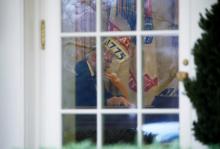
Strongmen, autocrats, and dictators don’t all do the same things. They do whatever they can to maximize their own wealth, power, and fame. The only thing that prevents them from going as far as they can is the resiliency of a society’s institutions and social sectors — like the media, the judiciary, political parties, law enforcement, civil society, and places of vocational or historical moral authority like faith communities.
So how are we faring on those fronts?
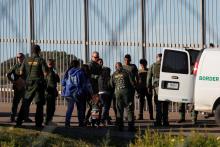
“God created mankind in his own image, in the image of God he created them; male and female he created them.” —Genesis 1:27 NIV
But we have too often used language that denies the truth that each immigrant — regardless of their country of origin, legal status, ethnicity, religion, or any other qualifier — is a person made in your image, with inherent dignity and potential.

In 1980, for the first time in 1,000 years, more believers following the babe in Bethlehem lived in the global South than the North, and in four decades since then this has accelerated. Growth in Latin America means 600 million exchange “Feliz Navidad,” or “Feliz Natal” (Portuguese) during these days in crowded Catholic cathedrals, megachurches, and Pentecostal storefronts. This is an increase of 10 million in the past year.
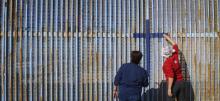
Why does the God of the Bible, the angels who announce the birth of Christ, then Jesus himself, keep telling us, again and again, not to be afraid or to live in fear? Perhaps it is because our human nature makes us fearful. And what we most easily fear are the people who are “different” than us. Fear of “the other” is a very common human trait.